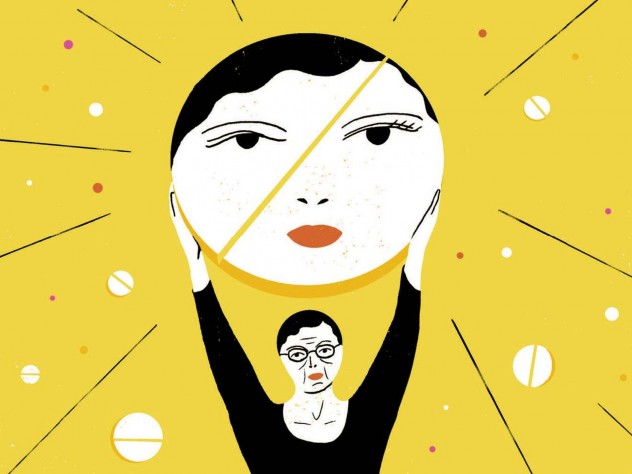When my daughter became pregnant for the first time at 45—with no help from modern medicine—she was told she was probably aging slowly, since it’s rare for women to conceive at that age. She might even be a future centenarian.
Others may be aging too fast. Quite a few people have been saying recently that, after two years of living with the stress and uncertainty of the pandemic, they feel more than two years older, and they suspect they’ve been aging faster. I’m wondering whether that has happened to me too. At 87, I’d hate to be galloping toward the end of my life.
Do some people age more quickly or more slowly than others? Can a crisis speed up the rate at which someone is growing older? Curious and a little anxious, I did some research and found the topic more fascinating—and more important—than I’d expected.
Until about 20 years ago, most scientists assumed everyone aged at about the same rate. Now we know that some people do age faster than most, and that a person’s biological age might not be the same as their chronological age. I could be 87, according to my birth certificate, while the cells in my body have the characteristics of someone who’s just 84. Or someone who’s 95.
Thousands of researchers are trying to find ways to slow aging down for all of us, to extend our healthspans and our lives. There are a few early signs that they may succeed.
The first step in this research was to find reliable ways to gauge someone’s biological age. Several methods have now been identified. Most promising, perhaps, is the one developed by geneticist Steve Horvath of the University of California, Los Angeles. He analyzes the epigenome, the array of chemical compounds that attach to DNA and turn genes on or off.
Horvath discovered that, as these compounds attach and detach, they form patterns that change in predictable ways as we grow older. He uses epigenetics to determine the biological age of cells, and his studies show that those who are aging faster than most run a small but significant risk of having poorer health and living a shorter life.
People who are aging quite slowly, on the other hand, are more likely to become centenarians. Horvath says there can be as much as a 15-year difference between a centenarian’s chronological and biological ages.
Women generally grow older (biologically) more slowly than men do, and Horvath believes that may be why they live longer, on average. Slower aging could also explain something called “the Hispanic paradox.” People of Hispanic ancestry are long-lived, compared to other ethnic and racial groups, despite the fact that they’re more likely to develop diabetes and other serious health problems.
Horvath estimates that as much as 40 percent of aging speed is determined by heredity. But infectious diseases can accelerate aging, and stress can as well. Which brings us back to the pandemic. A recent article in Nature suggested that COVID may have speeded up aging not only for those who have been infected but for many who simply struggled with the isolation and upheaval.
Lifestyles can also affect the rate at which we age. Research suggests that those who have had more education are apt to age more slowly than others, as are those who are physically active, eat a high-plant diet with lean meats and drink in moderation.
Horvath has big ambitions. He’s hoping to find a way to increase human healthspans by 10 or 15 years. And he’s had some early, promising results.
In a small, clinical trial, nine participants took a chemical compound for a year. At the end of that time, when he analyzed their epigenomes, they were biologically two and a half years younger than they were a year earlier. The treatment had not only slowed their aging but reversed it!
Horvath’s team will go on to test their approach in much bigger trials. In the future, he says, many more people may make it to 122—the longest human life on record.
Do we really want to add so many years to our lives? I’ve asked friends who are, like me, in their 80s, and they say they don’t—not if it means lingering on, frail and chronically ill. Nobody wants that.
But the stated goal of researchers like Horvath is to extend healthspans as well as lifespans and to delay the onset of aging-related diseases like dementia, cancer and heart disease. And it’s true that most centenarians stay remarkably healthy until not long before they die. Perhaps that’s a bonus that comes with aging slowly.
If so, and if epigenetics or some other intervention will get us there, I’m all for it.

Flora Davis has written scores of magazine articles and is the author of five nonfiction books, including the award-winning Moving the Mountain: The Women’s Movement in America Since 1960 (1991, 1999). She currently lives in a retirement community and continues to work as a writer.



